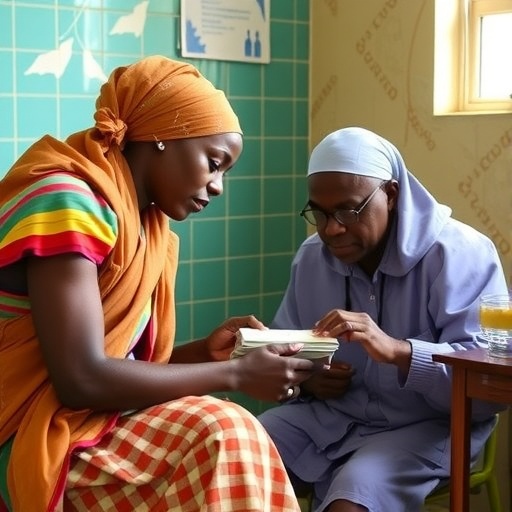
In recent years, the importance of preventative health measures, especially among marginalized communities, has gained significant attention in the realm of public health. A recent study conducted by Yadav et al. delves into the factors influencing the implementation of health checks aimed at the prevention and early detection of chronic diseases among Aboriginal and Torres Strait Islander people within Australian primary healthcare settings. This critical research presents a fascinating exploration of how systemic, societal, and cultural dynamics shape healthcare accessibility and effectiveness.
Chronic diseases represent a predominant health challenge globally, leading to substantial morbidity and mortality. For Aboriginal and Torres Strait Islander populations in Australia, the statistics are stark and alarming. These communities experience disproportionately high rates of chronic conditions such as diabetes, cardiovascular diseases, and respiratory issues, often stemming from historical inequalities, lack of access to quality healthcare, and socio-economic disadvantages. Understanding the barriers and facilitators to health checks in these populations is crucial to developing effective health interventions.
Healthcare checks are essential in identifying health risks early, promoting timely interventions, and ultimately reducing the burden of chronic diseases. However, the implementation of these checks in Aboriginal and Torres Strait Islander communities is often impeded by a myriad of challenges. The study by Yadav and colleagues offers vital insights into these complexities, employing an evidence mapping review to compile existing research and data on the subject.
The concept of holistic health is central to many Indigenous cultures and plays a significant role in how health is perceived and approached. Traditional beliefs and practices often intersect with Western healthcare systems, creating a unique environment where both sets of paradigms must be navigated. The article highlights that for health checks to be effectively implemented, they must resonate with the culturally grounded values and practices of Aboriginal and Torres Strait Islander people. This cultural sensitivity can enhance trust and participation in preventative health measures.
The research underscores the importance of community engagement and empowerment in facilitating health checks. The study reveals that when healthcare providers actively involve Indigenous communities in the design and execution of health interventions, there is a marked increase in the uptake of health checks. This collaborative approach ensures that health programs are not only relevant but also respected within the cultural context of the communities they aim to serve.
Moreover, the investigation touches upon the role of healthcare providers and their understanding of the unique histories and experiences of Aboriginal and Torres Strait Islander peoples. The findings stress the necessity for healthcare professionals to receive training that enhances their cultural competence, enabling them to provide care that acknowledges and respects the diverse backgrounds of their patients. Such training is vital in bridging the gap between conventional healthcare approaches and the Indigenous health experience.
Access to healthcare facilities also plays a critical role in the implementation of preventive health measures. The study outlines that geographical barriers, such as the remoteness of many Aboriginal and Torres Strait Islander communities, significantly hinder access to essential health services. This geographic isolation, coupled with often limited health resources, results in lower rates of health check participation. Addressing these logistical challenges must be a priority for policymakers to ensure equitable healthcare access.
Policy frameworks and government initiatives significantly influence the accessibility and implementation of health checks. The article emphasizes the need for informed policymaking that takes into account the specific circumstances and requirements of Indigenous populations. It advocates for policies that not only increase funding and resources for community health initiatives but also promote long-term sustainability and community-led health solutions.
The emotional well-being of individuals also intersects importantly with health check participation. Yadav et al. highlight how experiences of racism and discrimination can negatively impact the health of Aboriginal and Torres Strait Islander people, leading to decreased engagement with healthcare systems. Addressing mental and emotional health, alongside physical health checks, is essential in creating an environment where individuals feel supported and empowered to seek care.
Telehealth has emerged as a potential solution to overcome some barriers related to geographic accessibility. The effectiveness of telehealth in reaching underserved communities has been laid bare during the COVID-19 pandemic. Yadav’s research reflects on how integrating telehealth services can enhance access to health checks, particularly for those in remote areas. As technology continues to evolve, the provision of telehealth resources must be a critical component of health system reforms aimed at Aboriginal and Torres Strait Islander populations.
Furthermore, the implementation of culturally appropriate health education campaigns is necessary to encourage proactive health behaviors among Indigenous communities. The study suggests that leveraging traditional communication methods, such as storytelling and community events, can play a vital role in disseminating health information. Creating relatable and engaging materials will foster a greater understanding of the importance of health checks among individuals who might otherwise refrain from seeking medical care.
The intersection of education, health literacy, and chronic disease prevention cannot be overlooked. The research findings advocate for integrated educational programs that empower Aboriginal and Torres Strait Islander people with knowledge about their health. Building health literacy can help combat misinformation and promote healthier lifestyle choices, which are vital in the prevention of chronic conditions.
In summary, the evidence mapping review conducted by Yadav et al. presents a comprehensive overview of the various factors influencing the implementation of health checks among Aboriginal and Torres Strait Islander people in Australian primary healthcare. By advocating for culturally sensitive approaches, community engagement, effective policymaking, and leveraging technology, the study outlines a pathway toward improving health outcomes for these populations.
Through understanding the intricacies of their healthcare experiences and actively addressing the barriers that persist, the healthcare system can evolve to better serve Indigenous communities. This research not only sheds light on pressing health challenges but also inspires hope for a more equitable future in healthcare provision.
Subject of Research: Implementation of health checks in Aboriginal and Torres Strait Islander communities for chronic disease prevention.
Article Title: What influences the implementation of health checks in the prevention and early detection of chronic diseases among Aboriginal and Torres Strait Islander people in Australian primary health care?
Article References:
Yadav, U.N., Thottunkal, S., Agostino, J. et al. What influences the implementation of health checks in the prevention and early detection of chronic diseases among Aboriginal and Torres Strait Islander people in Australian primary health care? Findings from an evidence mapping review.
Health Res Policy Sys 23, 70 (2025). https://doi.org/10.1186/s12961-025-01325-9
Image Credits: AI Generated
DOI: [Not provided]
Keywords: chronic diseases, health checks, Aboriginal and Torres Strait Islander people, primary health care, preventive measures, health disparities, community engagement.
Tags: Aboriginal health disparitieschronic disease prevention Australiacultural dynamics in healthearly detection of chronic diseaseshealth interventions for marginalized populationshealthcare accessibility Indigenous communitiesIndigenous health checkspreventative health measuresprimary healthcare for Aboriginal peoplesocio-economic factors health checkssystemic barriers to healthcareTorres Strait Islander health challenges




